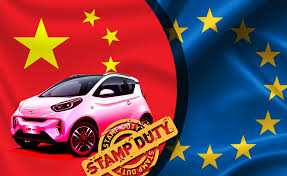Europe imposes higher tariffs on electric vehicles made in China

Brussels: Consumers in Europe may face higher prices for electric vehicles made in China after tariffs on the cars came into effect on Wednesday as part of an effort by European leaders to create what they call a level playing field for domestic auto companies.
The higher tariffs stem from an investigation the European Union started into subsidies provided by Beijing that helped carmakers in China produce and sell electric vehicles, giving them a competitive edge over their European rivals.
Chinese automakers, already forced out of the U.S. market because of tariffs levied against them there, have called the E.U. tariffs “protectionist” and “arbitrary,” arguing that their economies of scale have led to the rapid development of electric vehicle production.
The new tariffs, which come on top of existing import duties of 10 percent, vary based on the amount of subsidies each automaker in China received, starting at 7.8 percent for Tesla and go up to 35.3 percent for SAIC Motor of Shanghai. They are to remain in place for five years.
The automotive sector is crucial to Europe, employing 13.8 million people and accounting for 7 percent of the overall E.U. economic output. But Europe’s automakers were slow to develop battery and gasoline-electric hybrid technologies for cars, instead spending decades focusing on trying to make diesel-fired combustion engines more efficient.
Only after Volkswagen was found to be cheating on its emissions in 2015 did the European automakers shift their focus to battery technology in earnest. By that time, Chinese car companies, including those like BYD that began as battery producers, had been working on electric cars for years.
The United States and Canada have both imposed 100 percent tariffs on electric vehicles made in China, but European leaders said they aim to slow imports of Chinese-made electric vehicles, rather than stop them altogether.
“Europe doesn’t want to hamper its own electric vehicle green transition by making Chinese cars prohibitively expensive,” said Emre Peker, a London-based director for Europe at the Eurasia Group, a private consulting firm.
The market share of Chinese-made electric vehicles in the European Union has jumped to more than 20 percent from around 3 percent three years ago, according to ACEA, a European auto industry group. A failure to impose tariffs would have resulted in significant job losses in Europe, a senior European official said this week.
A senior European diplomat, who spoke on condition of anonymity per diplomatic practice, said the tariffs were critical for protecting the European auto industry.
What Europe’s carmakers say about the tariffs. European carmakers opposed the tariffs, with several countries, including Germany, home to BMW, Mercedes-Benz and Volkswagen, having voted against them. German carmakers have large investments in China and are concerned that the Chinese will retaliate.
Volkswagen has argued it was more important to maintain free and open markets than to seek to dampen competition.
“Under a tariffs regime, an industry only loses time,” Arno Antlitz, Volkswagen’s financial chief, told reporters in a call on Wednesday. The Chinese automakers “will sell cars from within Europe,” he said.
Carlos Tavares, chief executive of Stellantis, which owns more than a dozen brands including Chrysler, Fiat, Jeep, Peugeot and Ram, has also called the tariffs counterproductive.





